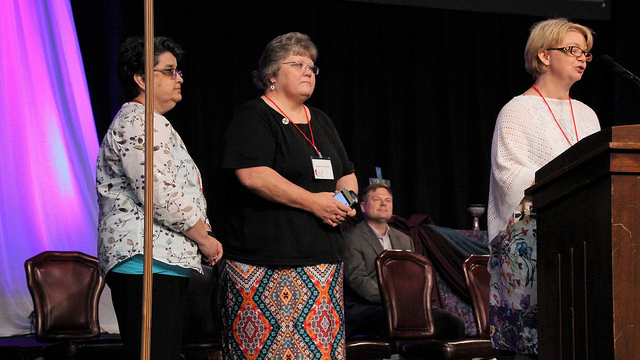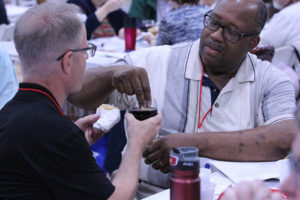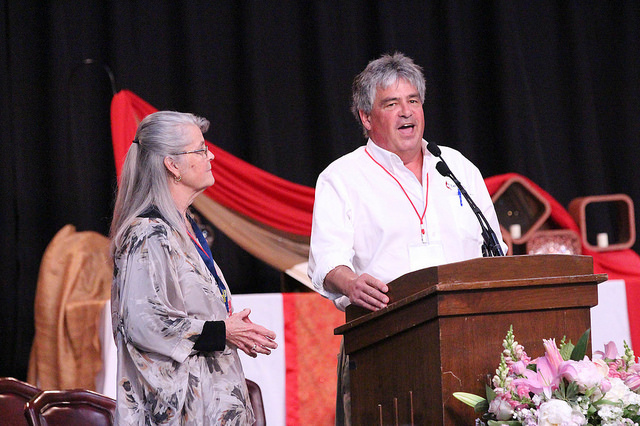 The Revs. Andrea Haldeman (at mic) and Alicia Julia-Stanley (left) and Barbara Skarbowski deliver a monitoring report to the 2017 Annual Conference. Sabrina Daluisio photo
The Revs. Andrea Haldeman (at mic) and Alicia Julia-Stanley (left) and Barbara Skarbowski deliver a monitoring report to the 2017 Annual Conference. Sabrina Daluisio photo
By John W. Coleman
The Eastern PA Annual Conference in 2017 used a new and improved process for monitoring its session for inclusiveness—“a quality of including many different types of people and treating them all fairly and equally.” The process worked so well, the monitoring team will try it again this year.
As usual, the conference commissions on Religion and Race (CORR) and Status and Role of Women (COSROW), and the Disability Ministries Committee will collaborate in the monitoring task. But like last year, they will use a process akin to crowd-sourcing to garner observations and impressions of whether, and to what degree, the conference demonstrates visible inclusiveness in its leadership, worship and other cultural expressions, behaviors and activities.
 What reflects that quality of inclusiveness is significant participation by, and respect for, primarily persons of different races and ethnicities, genders and abilities. When and where that quality is found to be evident or lacking, it should be publicly noted and acknowledged, with a goal to improve performance.
What reflects that quality of inclusiveness is significant participation by, and respect for, primarily persons of different races and ethnicities, genders and abilities. When and where that quality is found to be evident or lacking, it should be publicly noted and acknowledged, with a goal to improve performance.
In 2017, the three monitoring committees shared the monitoring burden and opportunity with conference attendees. They placed cards with simple questions on each table allowing anyone to record what they saw, heard or felt before anonymously placing their completed cards in a collection box.
Each evening the feedback cards were collected and read for preparation of the next day’s session monitoring report. After the conference, the committees compiled a final report together and responded to individuals who requested follow-up conversations about particular concerns. Although sexual orientation is not specifically represented in the purview of the three official monitoring groups, comments about a lack of inclusiveness for LGBTQIA persons were reported and received follow-up responses when requested, according to the Rev. Susan Worrell, CORR co-chairperson.
A process that was reportedly “well-received by many” led to many “praises and points of concern” expressed in the final report. Topics ranged from worship services, onstage presenters and language interpretation, to kind and unkind interactions, and a lack of accessibility and comfort for some persons with and without disabilities.
Praises included:
- the diversity and creativity in music and worship (including “joy” at hearing organ music played);
- the participation of youth and young adults, people of different races and LGBTQIA persons onstage;
- several mentions of Tom Albin’s enlightening, “affirming” keynote session on prayer that for some respondents inspired “an enhanced sense of acceptance”;
- helpfulness and friendliness of some attendees toward others, including toward a mother tending to her special-needs child (mentioned at least twice)
Conversely, concerns expressed included a lack of diversity onstage in personnel and worship styles, no Spanish language translation service, poor visibility on the visual screens for some, and challenges for people with mobility problems in obtaining meals from the buffet tables.
Behavior toward LGBTQIA persons cited
There were also some complaints about “disrespectful” and “contemptuous” behavior toward LGBTQIA persons, as well as several who said they felt “marginalized,” were not allowed to speak due to “procedural uses of Robert’s Rules of Order” and “witnessed a mean-spiritedness with cheers and laughter erupting when resolutions regarding sexuality were withdrawn or defeated.”
Some felt they were “chastised for not supporting the LGBTQIA community,” while others reported feeling “offense” at the wearing of LGBTQ-supportive rainbow stoles. And one attendee complained of the lack of a bathroom for transgender persons.
While there were complaints about the food quality at the Expo Center in Oaks, the most frequent and severe criticisms were about the chairs, described as “rickety” and “unsafe” for three days of sitting. The Sessions Commission, which plans and evaluates Annual Conference sessions, has addressed these issues for this year’s conference, although the change to better chairs and food led to a slight registration cost increase.

The Revs David Goss, of the Disabilities Committee, and Susan Worrell of CORR deliver a monitoring report at the 2017 Annual Conference. Sabrina Daluisio photo
“The monitoring process we implemented last year and will use again this year,” said Worrell of CORR, “has been designed to offer all conference attendees the opportunity to notice and report incidents of both the evidence of being respected, honored and belonging to a beloved community, as well as incidents of feeling marginalized, disregarded or rejected. The desire of the monitoring team is for everyone to have their voices heard and their experiences validated.”
Worrell is joined in the monitoring task by the Rev. Alicia Julia-Stanley, CORR co-chairperson; Barbara Skarbowski and the Rev. David Goss, outgoing and incoming chairs of the Disabilities Committee; the Rev. Andrea Haldeman, chairperson of COSROW; and monitoring team members from their respective committees.
Main photo: The Revs. Andrea Haldeman (at mic) and Alicia Julia-Stanley (left) and Barbara Skarbowski (center) deliver a monitoring report to the 2017 Annual Conference. Sabrina Daluisio photo
